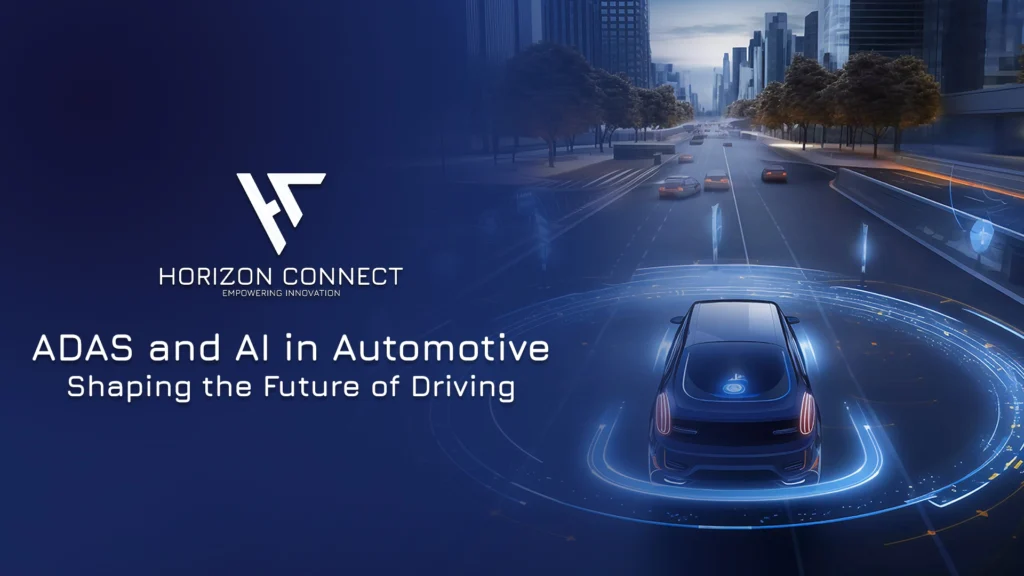ADAS and AI in automotive are revolutionizing the driving experience, making vehicles smarter, safer, and more efficient. Advanced Driver Assistance Systems (ADAS) use AI-driven technology to support drivers, reduce accidents, and pave the way for autonomous driving. At Horizon Connect, we are at the forefront of developing solutions that leverage ADAS and AI to transform the automotive landscape.
How ADAS and AI Work Together
ADAS (Advanced Driver Assistance Systems) uses AI (Artificial Intelligence) to interpret data from sensors, cameras, and radar systems. This combination allows vehicles to make intelligent decisions, such as detecting obstacles, maintaining lane discipline, and applying emergency brakes. AI’s ability to learn and adapt enhances the reliability of these systems, making roads safer for everyone.

Key Features of ADAS Powered by AI
- Lane-Keeping Assistance
AI-enabled cameras detect lane markings and help drivers stay centered. Horizon Connect provides systems that use advanced algorithms to minimize lane-drift incidents. - Adaptive Cruise Control
AI technology adjusts vehicle speed to maintain a safe distance from the car ahead. This feature improves highway safety and driving comfort. - Automatic Emergency Braking
By using AI to process sensor data, ADAS systems can identify potential collisions and automatically apply the brakes. This life-saving feature is becoming standard in modern vehicles. - Pedestrian Detection
AI analyzes data to identify pedestrians and take preventive measures. Horizon Connect’s solutions are designed to make urban driving safer.
The Role of AI in Autonomous Vehicles
AI isn’t just improving ADAS; it’s also the cornerstone of fully autonomous vehicles. Machine learning algorithms are used to understand complex driving environments and make decisions in real-time. As self-driving technology advances, AI continues to play a critical role in the journey toward fully autonomous transportation.
Benefits of ADAS and AI in Automotive
- Enhanced Safety: ADAS reduces human error, which is a leading cause of accidents.
- Driver Comfort: Features like adaptive cruise control and traffic sign recognition make driving less stressful.
- Efficient Traffic Management: AI systems help optimize traffic flow and minimize congestion.
- Energy Efficiency: Smart systems contribute to fuel efficiency by promoting smoother driving habits.
Challenges and Future Prospects
Despite the advances, there are challenges to overcome. AI in automotive systems requires rigorous testing to ensure reliability in diverse conditions. Data privacy and cybersecurity are also top concerns, as connected vehicles generate vast amounts of information. Horizon Connect is committed to developing secure and efficient ADAS and AI solutions that meet these challenges.
Conclusion
The integration of ADAS and AI in automotive is transforming driving as we know it. These technologies are not only making vehicles safer but also laying the foundation for a future of fully autonomous cars. Horizon Connect continues to innovate in this field, offering cutting-edge solutions that enhance safety, comfort, and efficiency on the road.


